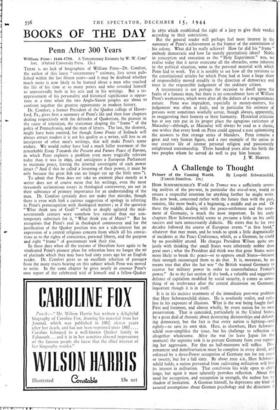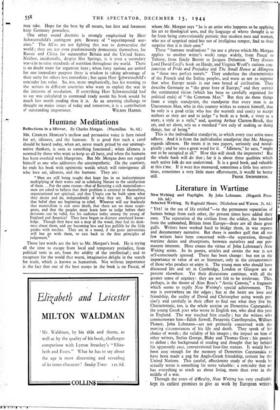A Challenge to Thought
Primer of the Coming World. By Leopold Schwarzschild. (Hamish Hamilton. 10s.)
HERR SCHWARZSC.HILD'S World in Trance was a sufficiently arrest- ing analysis of the pre-war, in particular the eve-of-war, world to ensure a respectful attention for anything further he might write. His new book, concerned rather with the future than with the past, consists, like most books, of a beginning, a middle and an end. Of these the middle, dealing with the peace-settlement and the treat- ment of Germany, is much the most important. In his early chapters Herr Schwarzschild seems to presume a little on his early success and turn unnecessarily didactic. He states that he for two decades followed the course of European events "at first hand," whatever that may mean, and he tends to speak a little dogmatically of incidents at the Peace Conference, which, as a German, he could by no possibility attend. He charges President Wilson quite un- justly with thinking that small States were inherently nobler than great ones ; what the President did think was that great States were more likely to break the peace—or to oppress small States—because their strength encouraged them to do that. It is, moreover, by no means true that after the last war "the British wanted Germany to recover her military power in order to counterbalance France's power." As to the last section of the book, a valuable and suggestive defence of capitalism modified by social security, it comes as some- thing of an irrelevance after the central discussion on Germany, important though it is in itself.
It is in his incisive treatment of the immediate post-war problem that Herr Schwarzschild shines. He is resolutely realist, and ruth- less in his exposure of illusions. What is the war being fought for? First and foremost, and almost wholly, by every nation for its own preservation. That is concealed, particularly in the United States, by a great deal of rhetoric about destroying dictatorships and defend- ing democracy, but the fact is that every nation is fighting—and rightly—to save its own skin. Here, as elsewhere, Herr Schwarz- schild over-simplifies the issue, but his challenge to reflection is altogether wholesome. After the war (to leave Japan for the moment) the supreme task is to prevent Germany from ever repeat- ing her aggression. For that no half-measures will suffice. Dis- armament and demilitarisation must be complete in every detail, and enforced by a three-Power occupation of Germany not for ten years or twenty, but for a full sixty. By about z000 A.D., Herr Schwarz- schild holds, a nation prevented from cultivating militarism will lose its interest in militarism. That conclusion lies wide open to cha!- lenge, but again it most salutarily provokes reflection. About the need for occupation, and occupation in strength, the author has no shadow of hesitation. A German himself, he deprecates any kind of assured assumptions about German psychology and the directions it
may take. Hope for the best by all means, but first and foremost keep Germany powerless.
One other sound doctrine is strongly emphasised by Herr Schwarzschild's astringent pen. Beware of "superimposed war- aims." The All'es are not fighting this war to democratise the
; they are not even predominantly democratic themselves, for Russia and China far outnumber Britain and the United States. Neither, incidentally, despite Hot Springs, is it even a secondary war-am to raise standards of nutrition throughout the world. There is no doubt room for argument here ; when forty nations are united for one immediate purpose there is wisdom in taking advantage of their unity for others less immediate ; but again Herr $chwarzschild's reminder has value. So, too, more emphatically, has his warning to the writers in different countries who want to exploit the war in the interests of revolution. If everything Herr Schwarzschild had to say was calculated to command ready assent his book would be much less worth reading than it is. As an arresting challenge to thought on major issues of today and tomorrow, it is a contribution



























 Previous page
Previous page